
Herri met de Bles c1510-after 1555 Saint Jerome medidating

As most voices seem convinced QT would be madness.
• Fed’s QE Unwind Accelerates Sharply (WS)
The QE Unwind is ramping up toward cruising speed. The Fed’s balance sheet for the week ending May 2, released this afternoon, shows a total drop of $104 billion since the beginning of the QE Unwind in October – to the lowest level since June 11, 2014. During the years and iterations of QE, the Fed acquired $3.4 trillion in Treasury securities and mortgage-backed securities. The mortgages underlying those MBS are guaranteed by Fannie Mae, Freddie Mac, and Ginnie Mae. The “balance sheet normalization,” as the Fed calls it, was nudged into motion last October. But the pace accelerates every quarter until it reaches up to $50 billion a month in Q4 this year.
This would trim the balance sheet by up to $420 billion this year, and by up to $600 billion in 2019 and every year going forward, until the Fed considers the balance sheet to be adequately “normalized” — or until something big breaks, whichever comes first. [..] The balance of Treasury securities fell by $17.6 billion in April. This is up 60% from March, when $11 billion “rolled off.” Since the beginning of the QE-Unwind, $70 billion in Treasuries “rolled off.” Now at $2,395 billion, the balance of Treasuries has hit the lowest level since June 18, 2014.
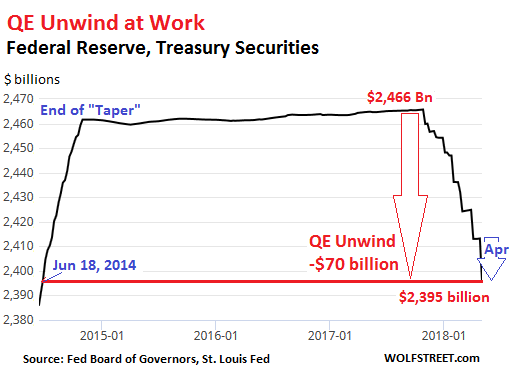
[..] Residential MBS are different from regular bonds. Holders receive principal payments on a regular basis as the underlying mortgages are paid down or are paid off. At maturity, the remaining principal is paid off. Over the years, to keep the MBS balance from declining, the New York Fed’s Open Market Operations (OMO) has been continually buying MBS. But settlement of those trades occurs two to three months later. The Fed books the trades on an as-settled basis. The time lag between the trade and settlement causes the large weekly fluctuations on the Fed’s balance sheet. And it also delays when MBS that “rolled off” actually disappear from the balance sheet.
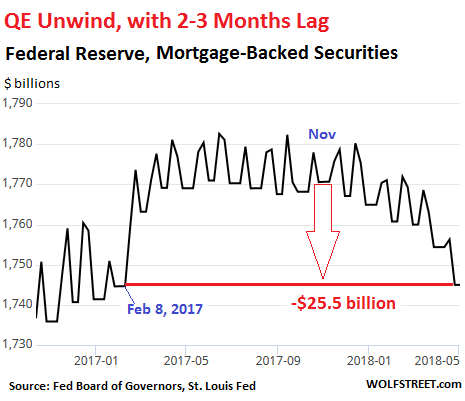
[..] Total assets on the Fed’s balance sheet dropped by $30 billion in April, and by $104 billion since the beginning of the QE-Unwind, to $4,356 billion. This is the lowest since June 11, 2014. Note that total assets are now down by $160 billion from the peak in January 2015:
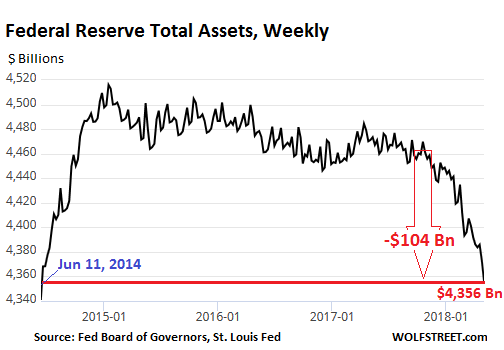

“The poor stay poor, the rich get rich. That’s how it goes. Everybody knows.”
• The Root of It All (Batnick)
Steven Pinker wrote, “In almost every year from 1992 through 2015, an era in which the rate of violent crime plummeted, a majority of Americans told pollsters that crime was rising. In late 2015, large majorities in eleven developed countries said that “the world is getting worse.” But crime isn’t rising, and the world is objectively getting better. And while life is improving at the macro level, at the micro level, people aren’t feeling so great. So what gives? We tend to expect the worst as a way to insulate ourselves from disappointment. Life is not about good or bad, it’s about better or worse, so if things don’t turn out as bad as we imagine, we’re pleasantly surprised. If you were asked to think about how your life could improve, a few things might come to mind.
But imagine how your life could get worse, and a barrage of negative possibilities fills your brain. The risk and reward of every day life is asymmetrical. This is why being a pessimist feels safe and being an optimist feels reckless. [..] While the news certainly isn’t doing anyone any favors, there are legitimate reasons why people don’t feel like things are getting better. For too many, they aren’t. The chart below shows the change in real income since 1980. This chart is the root of all the negative things facing our society. People in the top 20% saw their income increase by 60%. People in the bottom 20% saw their income rise by just 5% over the same time. As Leonard Cohen said, “The poor stay poor, the rich get rich. That’s how it goes. Everybody knows.”
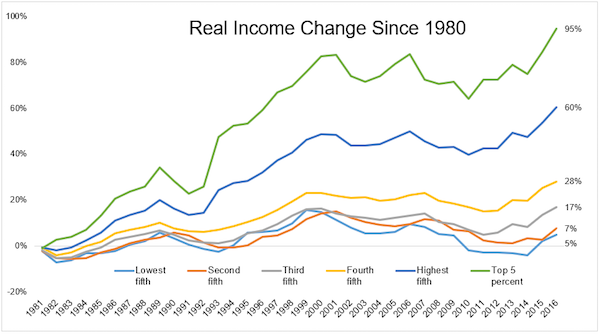
Real income increased 38% from 1980-2016, or just 0.87% per year, and 70% of that increase went to people in the top 20%. Things are better, especially around the world, but in our country, way too many people are getting left behind. Extreme poverty is collapsing, but relative poverty is exploding, and everything in life is relative. If things don’t feel better than they were two hundred years ago, it’s because people compare themselves to their neighbors, not to their ancestors.
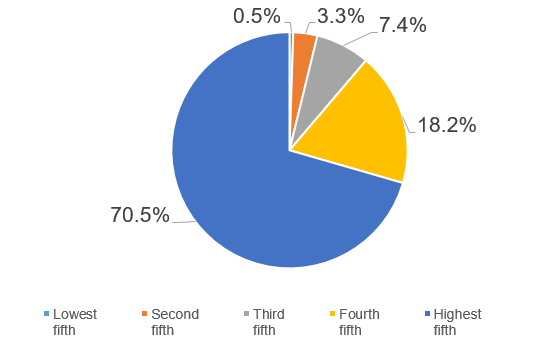

As simple as that.
• Tesla Is A Zombie Company (F.)
Tesla’s quarter was terrible from a financial perspective, as I had expected. The controlling figure I use, operating cash flow (operating loss plus depreciation minus capital expenditures,) was reported as -$836 million in the quarter, which very nearly approximates one quarter of 2017’s full year cash outflow of $3.4 billion. Things are not improving at Tesla from a financial perspective, and the second quarter is likely to be just as bad as the first. For the third consecutive quarter, Tesla posted negative EBITDA (-$180 million) and if this were any other company, there would be an active death watch on the Street. Tesla’s bonds have dropped sharply in today’s trading, now quoted at 87 cents on the dollar.
This is not surprising given that Tesla is not even remotely close to earning enough profit to cover its interest expense, which management estimated would be $160 million in the second quarter. Tesla added $346 million to its now $10 billion debt pile in the quarter, and the management’s weasel-worded projection of “positive net income excluding non-cash stock based compensation in Q3 and Q4” would still leave Tesla short of covering its debt service costs, by my calculations. So, from a financial perspective, Tesla is a zombie company. There is simply no justification for Tesla’s current market capitalization of $47.2 billion, and the market eventually figures these things out. It’s actually been a slow burn for Tesla shares, not a plummet, but that can be just as painful.
On September 12, 2014, Teslashares closed at $279.20 and the Nasdaq Composite closed at 4567.60. As of this writing, Tesla is trading at $279.04 and the Nasdaq is trading at 7011.00. So that’s where the value destruction Musk has wrought is evident. His shares are down slightly in a period in which his peer companies have collectively risen 53.5%.

Housing bubbles break communities.
• With No Letup In Home Prices, The California Exodus Surges (MW)
Over a million more people moved out of California from 2006 to 2016 than moved in, according to a new report, due mainly to the high cost of housing that hits lower-income people the hardest. “A strong economy can also be dysfunctional,” noted the report, a project of Next 10 and Beacon Economics. Housing costs are much higher in California than in other states, yet wages for workers in the lower income brackets aren’t. And the state attracts more highly-educated high-earners who can afford pricey homes. There are many reasons for the housing crunch, but the lack of new construction may be the most significant.
According to the report, from 2008 to 2017, an average of 24.7 new housing permits were filed for every 100 new residents in California. That’s well below the national average of 43.1 permits per 100 people. If this trend persists, the researchers argued, analysts forecast the state will be about 3 million homes short by 2025. California homeowners spend an average of 21.9% of their income on housing costs, the 49th worst in the nation, while renters spend 32.8%, the 48th worst. The median rent statewide in 2016 was $1,375, which is 40.2% higher than the national average. And the median home price was — wait for it — more than double that of the national average.
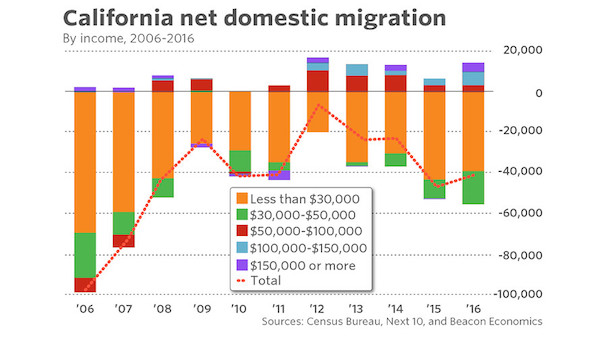

Globally, supple has a hard time keeping up with demand. Everybody involved knows this.
• Demand For US Soybeans Remains Strong Despite China (CNBC)
Demand for U.S. soybeans remains strong, regardless of worries China could target the crop in retaliation over Trump administration tariffs. China has canceled several shipments of U.S. soybeans in the last month, raising questions over whether the country is taking preemptive action against the U.S. by reducing purchases. But analysts say the reduction is a minor amount and is not that surprising from a seasonal perspective. The “U.S. accounts for 37 percent of total soybean exports throughout the world. Beyond Brazil, there’s really nobody else,” said Rich Nelson, director of research at Allendale, an agricultural market research and trading firm. “Despite the trade concerns, there’s really nobody else. You’re just simply not going to have a massive decline in U.S. soybean exports,” he said.
Chinese cancellations of U.S. soybean orders for the week ended April 26 resulted in a decline of 133,700 metric tons in net sales to China, USDA Foreign Agricultural Service data showed Thursday. But 66,000 metric tons of those soybeans were sent to Vietnam instead, the data showed. Meanwhile, the U.S. sold 82,700 metric tons of soybeans in new sales to Mexico, 68,800 to Taiwan, 60,000 to Argentina and 52,600 to the Netherlands. Although Argentina is the third-largest exporter of soybeans, a severe drought has reduced production by 7 million tons to 40 million, according to USDA estimates. “That just goes to show we’re not dependent on China for soybean exports,” said Michael Stumo, head of Coalition for a Prosperous America, a nonprofit representing the interests of those in manufacturing, agriculture and labor unions.
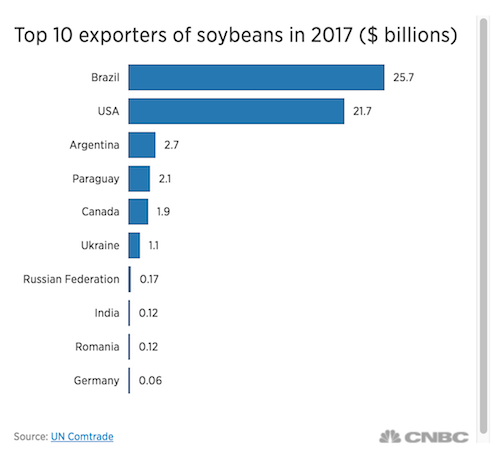

Germany doesn’t extradite its citizens.
• US Charges VW Ex-CEO With Conspiracy And Fraud (G.)
US authorities have charged Volkswagen’s former chief executive officer Martin Winterkorn with conspiracy and wire fraud in relation to the car company’s efforts to cheat on US diesel emissions tests. Winterkorn, who resigned in 2015 as the scandal was revealed, conspired to defraud the US and violate the Clean Air Act, federal laws designed to control air pollution, according to an indictment unsealed on Thursday in a Michigan federal court. Five other VW executives were also charged in the indictment. He becomes the highest-ranking executive to be charged over “dieselgate” – a scheme where VW used software to trick government emissions testers.
“The indictment unsealed today alleges that Volkswagen’s scheme to cheat its legal requirements went all the way to the top of the company,” said US attorney general Jeff Sessions. “These are serious allegations and we’ll prosecute this case to the full extent of the law.” When news of the scheme broke Winterkorn said he was “stunned that misconduct on such a scale was possible in the Volkswagen Group”. He denied any knowledge of the scandal – which was used to evade pollution limits on nearly 600,000 diesel vehicles. Last December, Oliver Schmidt, a senior Volkswagen executive, was jailed for seven years and fined $400,000 for his part in the scheme. Schmidt, who had returned to Germany, was arrested while on holiday in Florida. VW pleaded guilty as a corporation in March, agreeing to pay a record $4.3bn in fines.

“If Bob Mueller wants that kind of control over the executive branch, he should run for president. Otherwise, he is an inferior executive official who has been given a limited license — ultimately, by the chief executive — to investigate crime. If he doesn’t have an obvious crime, he has no business inventing one, much less probing his superior’s judgment. He should stand down.”
• Mueller’s Questions for Trump Show Folly of Special-Counsel Appointments (NR)
I am assuming the authenticity of the questions that Special Counsel Robert Mueller reportedly wants to ask President Trump. The questions indicate that, after a year of his own investigation and two years of FBI investigation, the prosecutor lacks evidence of a crime. Yet he seeks to probe the chief executive’s motives and thought processes regarding exercises of presidential power that were lawful, regardless of one’s view of their wisdom. If Bob Mueller wants that kind of control over the executive branch, he should run for president. Otherwise, he is an inferior executive official who has been given a limited license — ultimately, by the chief executive — to investigate crime. If he doesn’t have an obvious crime, he has no business inventing one, much less probing his superior’s judgment. He should stand down.
The questions, reported by the New York Times, underscore that the special counsel is a pernicious institution. Trump should decline the interview. More to the point, the Justice Department should not permit Mueller to seek to interrogate the president on so paltry and presumptuous a showing.
When should a president be subject to criminal investigation? It is a bedrock principle that no one is above the law. The Framers made clear that this includes the president. But, like everything else, bedrock principles do not exist in a vacuum. They vie with other principles. Two competing considerations are especially significant here. First, our law-enforcement system is based on prosecutorial discretion. Under this principle, the desirability of prosecuting even a palpable violation of law must be balanced against other societal needs and desires. We trust prosecutors to perform this cost-benefit analysis with modesty about their mission and sensitivity to the disruption their investigations cause.
Second, the president is the most essential official in the world’s most consequential government. That government’s effectiveness is necessarily compromised if the president is under the cloud of an investigation. Not only are the president’s personal credibility and capability diminished; such an investigation discourages talented people from serving in an administration, further undermining good governance. The country is inexorably harmed because a suspect administration’s capacity to execute the laws and pursue the interests of the United States is undermined.

Caitlin Johnstone on the Atlantic Council.
• Why We Need To Be Propagandized For Our Own Good (CJ)
I sometimes try to get establishment loyalists to explain to me exactly why we’re all meant to be terrified of this “Russian propaganda” thing they keep carrying on about. What is the threat, specifically? That it makes the public less willing to go to war with Russia and its allies? That it makes us less trusting of lying, torturing, coup-staging intelligence agencies? Does accidentally catching a glimpse of that green RT logo turn you to stone like Medusa, or melt your face like in Raiders of the Lost Ark? “Well, it makes us lose trust in our institutions,” is the most common reply. Okay. So? Where’s the threat there? We know for a fact that we’ve been lied to by those institutions. Iraq isn’t just something we imagined. We should be skeptical of claims made by western governments, intelligence agencies and mass media. How specifically is that skepticism dangerous?
Trying to get answers to such questions from rank-and-file empire loyalists is like pulling teeth, and they are equally lacking in the mass media who are constantly sounding the alarm about Russian propaganda. All I see are stories about Russia funding environmentalists (the horror!), giving a voice to civil rights activists (oh noes!), and retweeting articles supportive of Jeremy Corbyn (think of the children!). At its very most dramatic, this horrifying, dangerous epidemic of Russian propaganda is telling westerners to be skeptical of what they’re being told about the Skripal poisoning and the alleged Douma gas attack, both of which do happen to have some very significant causes for skepticism.
When you try to get down to the brass tacks of the actual argument being made and demand specific details about the specific threats we’re meant to be worried about, there aren’t any to be found. Nobody’s been able to tell me what specifically is so dangerous about westerners being exposed to the Russian side of international debates, or of Russians giving a platform to one or both sides of an American domestic debate. Even if every single one of the allegations about Russian bots and disinformation are true (and they aren’t), where is the actual clear and present danger? No one can say. No one, that is, except the Atlantic Council.

The entire MSM can’t get the job done?!
• Neocons Form Brand New Russia-Bashing ‘Think’ Tank (RI)
A group of neocon heartthrobs have banded together with an eclectic array of Russiagaters to form a visionary organization committed to protecting Western democracy. You can also pre-order their book, according to their website. Chaired by pompous chess wizard turned Kremlinologist Garry Kasparov, the brand-new Renew Democracy Initiative (RDI) is the latest three-letter-initialism non-profit devoted to “the defense of democratic freedom and prosperity.” The trailblazing think tank has already sent shockwaves through Washington, DC and every European capital. Celebrated war cheerleader Max Boot, who serves on RDI’s board of directors, announced the creation of this highly original organization in a Washington Post op-ed.
Interestingly, the unveiling started with a laundry list of 10 other groups that are already “protesting Trump and championing democracy.” So why does the world need RDI, then? Because RDI is different – some might even say “special.” Unlike the dozens of other well-financed bastions of status-quo thinking, RDI aims to “unite both the center-left and center-right” by promoting “liberty, democracy and sanity in an age of discord.” And where will this much-needed sanity come from? From RDI’s all-star team of important intellectuals and free thinkers, of course – some of whom just happen to be really tight with the other 10 groups mentioned in Boot’s WaPo piece. Dear Mr. Boot: does fighting Putin with the Committee to Investigate Russia allow enough spare time to fight Putin with the Renew Democracy Initiative? Curious minds want to know.

It’s contagious.
• UK Pushes To Strengthen Anti-Russia Alliance (G.)
The UK will use a series of international summits this year to call for a comprehensive strategy to combat Russian disinformation and urge a rethink over traditional diplomatic dialogue with Moscow, following the Kremlin’s aggressive campaign of denials over the use of chemical weapons in the UK and Syria. British diplomats plan to use four major summits this year – the G7, the G20, Nato and the European Union – to try to deepen the alliance against Russia hastily built by the Foreign Office after the poisoning of the former Russian double agent Sergei Skripal in Salisbury in March. “The foreign secretary regards Russia’s response to Douma and Salisbury as a turning point and thinks there is international support to do more,” a Whitehall official said.
“The areas the UK are most likely to pursue are countering Russian disinformation and finding a mechanism to enforce accountability for the use of chemical weapons.” Former Foreign Office officials admit that an institutional reluctance to call out Russia once permeated British diplomatic thinking, but say that after the poisoning of Skripal and his daughter, Yulia, that attitude is evaporating. A cross-party alliance in parliament has developed which sees the question of Russian corruption no longer through the prism of finance, but instead as a security and foreign policy threat, requiring fresh sanctions even if this causes short-term economic damage to the UK.
[..] For some old hands in the Foreign Office with deep experience of Russia, however, demonising Russia is a disastrous strategy. Sir Anthony Brenton, the British ambassador to Russia between 2004 and 2008, insists a fruitful common agenda with Moscow on issues such as nuclear disarmament, Islamist terrorism and cyberwarfare is still possible. “What on earth was her majesty’s foreign secretary doing comparing the Russian World Cup with Hitler’s 1936 Olympics?” he asked. “If you are looking for a single statement really calculated to infuriate the Russians there it is, or indeed the defence secretary telling Russia to shut up. Elementary diplomacy goes a long way with the Russians and we need to get back to that.”

Still feels like a weird story.
• Nobel Prize For Literature Postponed Amid Swedish Academy Turmoil (BBC)
The organisation that decides the Nobel Prize for Literature has said it will not announce an award this year, after it was engulfed in a scandal over sexual assault allegations. The Swedish Academy has been in crisis over its handling of allegations against the husband of a member. She has since quit, as have the academy’s head and four other members. The academy says it will now announce the 2018 winner along with the 2019 winner next year.
The scandal is the biggest to hit the prize since it was first awarded in 1901. The academy said the decision had been made due to a lack of public confidence. Some academy members had argued that the prize should proceed to protect the tradition, but others said the institution was in no state to present the award. Apart from six years during the world wars, there has been only one year when the prize was not awarded. No worthy winner was found in 1935.

You go girl. The only right thing to do.
• Jacinda Ardern Pledges Shelter For All Homeless People Within Four Weeks (G.)
The New Zealand government has promised to get the country’s homeless population off the streets and into shelter in time for winter. In a joint announcement on Friday, housing minister Phil Twyford and prime minister Jacinda Ardern announced a NZ$100m emergency housing package to tackle the ballooning problem. An estimated 40,000 people live in cars, tents and garages amid a chronic housing shortage in the nation of 4.7 million people. “We’re pulling out all the stops to support people in need and urgently increase housing supply this winter,” said housing minister Phil Twyford. “Our government will make sure everyone is helped to find warm, dry housing this winter.”
With winter starting on 1 June in the southern hemisphere, less than four weeks away, the government has put out an urgent call for anyone with additional accommodation that may be suitable to house homeless people. Seasonal worker accommodation such as shearers quarters, private rental properties, motor camps and maraes (Maori meeting houses) would all be considered. New Zealand has the highest rates of homelessness in the OECD, with more than 40,000 people living on the streets, in emergency housing or in substandard conditions. Per capita New Zealand’s homeless population is almost twice as bad as Australia, which is placed third on the list. More than half of New Zealand’s homeless population live in Auckland but it is also growing in smaller cities such as Rotorua, Tauranga, Queenstown and Wellington.








